Live on the homepage now!
Reader Supported News
This deep-thought balloon was one of several comments Trump made during his speech referencing the international crisis that has followed Russia’s invasion of Ukraine. That included claiming, as he and his allies have been doing in the aftermath of the invasion, that Russian president Vladimir Putin would have never invaded Ukraine if he were still in the White House. “I knew Putin very well,” Trump said. “He would not have done it. He would have never done it.”
While Trump did not offer further praise to Putin on Saturday, he did lavish some on North Korean leader Kim Jong-un. Trump fondly remembered the totalitarian dictator’s dominance over his staff when the two heads of state spent time together. “Seriously tough, he’s absolutely the leader of that country,” Trump said of Kim, admiring the leader’s “total control” and how his advisers “cowered” in his presence and were always “sitting at attention” when he spoke. “I looked at my people and said I want my people to act like that,” joked Trump.
A week prior at the Conservative Political Action Conference, Trump had briefly mentioned the situation in Ukraine, both condemning the invasion as “appalling” while also once again describing Putin as “smart.” Days later, the former president tried to claim in a statement that he had saved both NATO and Ukraine.
Trump, of course, is one of the world’s most well-known admirers of Putin outside of Russia, and during his presidency tried to withhold U.S. military aid to Ukraine in an attempt to pressure Ukrainian president Volodymyr Zelenskyy to dig up political dirt about Joe Biden’s family.
On Saturday, the former president also dismissed remarks former vice-president Mike Pence’s had aimed at Trump one day earlier at the same event in New Orleans. “There is no room in this party for apologists for Putin,” Pence had said. Trump responded that anyone who calls him a “Putin apologist” is just revealing they can’t be one of America’s “serious leaders.”
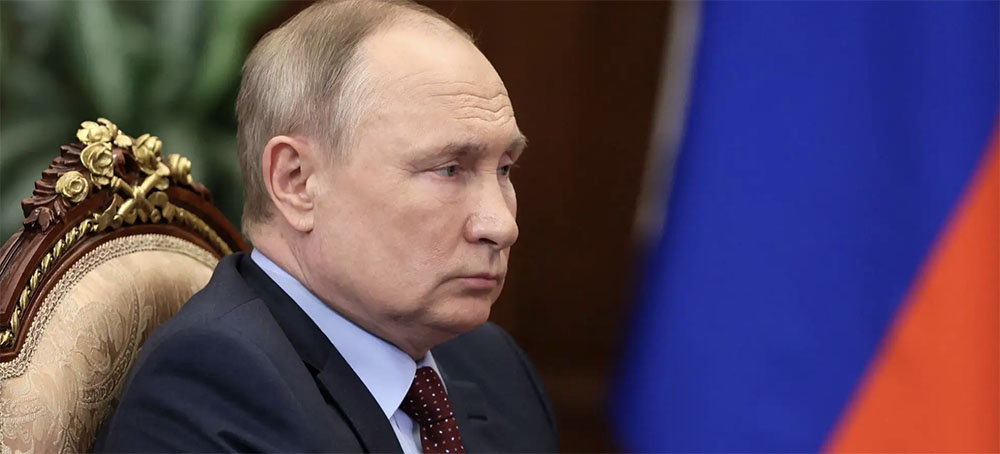 Russian president Vladimir Putin. (photo: Mikhail Klimentyev/Sputnik/AFP/Getty Images)
Russian president Vladimir Putin. (photo: Mikhail Klimentyev/Sputnik/AFP/Getty Images)
According to the journalist Ilya Lozovsky's English translation of Rustamova's Tuesday report, officials and members of parliament she spoke with said they were increasingly worried about how Putin was handling the war.
"In reality, the attitude toward the war within the corridors of power is ambiguous," Rustamova wrote, according to Lozovsky, whose translation she shared on Twitter and reposted in her Substack newsletter. "I came to this conclusion after speaking with several members of parliament and officials at various levels. Many of them are discouraged, frightened, and are making apocalyptic forecasts."
Rustamova recently fled the country and previously worked for the BBC Russian Service — which has since been suspended by the London-based network — as well as Meduza and the RBC, an investigative outlet that experienced a mass resignation in 2016.
"No one is rejoicing," a source described as "close to the Kremlin" told Rustamova, according to Lozovsky's translation. "Many understand that this is a mistake, but in the course of doing their duty they come up with explanations in order to somehow come to terms with it."
"Some officials aren't associating themselves with what's happening at all, viewing Putin's decision as a historical choice over which they have no influence, and the meaning of which no one will understand for a some time to come," Rustamova wrote.
Another person granted anonymity said Kremlin officials were "carefully enunciating the word clusterfuck" when describing the invasion.
Rustamova wrote that every source she talked to believed Putin wouldn't follow through on invading Ukraine and was instead looking to gain leverage for concessions, such as declaring Donetsk and Luhansk "people's republics."
"Everyone had some scattered information that did not provide an answer to the main question: Will we start bombing or not?" another person described as "close to the Kremlin" told Rustamova.
The Russian reporter also outlined how Putin had been limiting information to a close circle of advisors.
"Most likely, my sources say, only the narrowest circle had been informed: Defense Minister Sergei Shoigu, Chief of the General Staff Valery Gerasimov, and the leaders of the counterintelligence service," she wrote, according to Lozovsky's translation. "For example, the head of the presidential administration Anton Vaino, whose role, unlike his more influential predecessors, is more akin to a private secretary, is not informed about such decisions, my sources say."
A different person Rustamova described as "a good acquaintance of Putin's" said the Russian president's mood had gotten worse.
"Here he is in a state of being offended and insulted," the source said. "It's paranoia that has reached the point of absurdity."
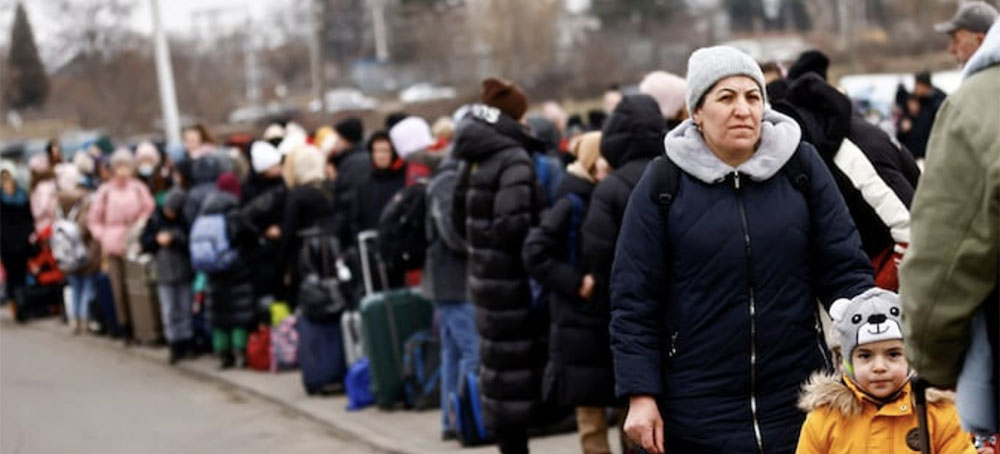 People wait to board a bus at the border checkpoint in Medyka after fleeing Ukraine. (photo: Yara Nardi/Reuters)
People wait to board a bus at the border checkpoint in Medyka after fleeing Ukraine. (photo: Yara Nardi/Reuters)
Gangs take advantage of vulnerable women and children fleeing invasion by luring them with promise of a lift and somewhere to live
As more than a million refugees flood westwards to escape Vladimir Putin's invading troops, a darker side to their welcome in central Europe has emerged.
Police on the border with Ukraine have made multiple arrests in the area of suspected traffickers preying on vulnerable woman and children with the promise of a lift and accommodation, sources told The Telegraph.
The authorities are understood to be particularly concerned about gangs seeking to lure vulnerable refugees to Germany for sexual exploitation.
Overwhelmed by the human tide crossing into Poland, officers are asking humanitarian volunteers at the Medyka checkpoint to demand to see proof of identities for men offering lifts to young women.
Tom Bell, one British volunteer, said: "A lot of desperate Ukrainins have gone on to Facebook or Telegram trying to hook up with people in Europe who can help them.
"Then, in a short space of time, they're getting picked up in a car by someone they've never met and don't know.
"The police have put me and other volunteers here on alert - they want us to check people's IDs to see who they are if they're picking up younger women, and for kids.
"We've been told it's a sex trade thing."
Mr Bell said vigilance had increased since last Thursday.
At both railway terminuses and road border crossings, there is a semi-formal network directing refugees to onward transport and accommodation.
However, there is nothing to prevent unaffiliated people stepping in to intercept the often exhausted new arrivals.
Last week, Save the Children warned that at least 400,000 young people were on the move across eastern Europe, putting them potentially at risk of abuse.
The organisation estimated that more than 40 per cent of refugees who have fled the fighting to Poland, Romania, Moldova, Hungary, Slovakia and Lithuania are children.
Even before Putin invaded Ukraine, Polish authorities have grown increasingly experienced in countering human smuggling gangs in the last year. Alexander Lukashenko, the Belarusian president, has deliberately channeled migrants from the Middle East into the European Union.
A police source at Medyka said: "We are concerned about the exploitation of children and women coming over the border.
"We know of a few examples of people who have tried it, and some people have been arrested already."
Poland has also stepped up its efforts to ensure children entering the country without an obvious relative are legally accounted for.
All-night courts have been taking place to approve legal guardianship of adults offering to look after non-related children once in Poland.
Mr Bell was last week assigned guardianship of Maks Kowalenko, a nine-year-old Ukrainian boy - the younger brother of a friend he plays rock music with - whom he travelled into the war zone to rescue.
The 37-year-old, who lives in southern Poland, said: "The Polish border guards sat Maks and me in a room almost all night while they spoke to his mother to make sure I was who I said I was.”
A father already, he said: "I have to say I didn't expect to be adopting a child, but I've said to Maks' family that in a worse-case scenario that the war doesn't end and he can't go back, he can live with my family indefinitely."
Lauren Agnew, human trafficking policy expert at the social policy charity Care, said the conflict in Ukraine was “hugely alarming” for those working to combat human trafficking. She warned governments across Europe to be “mindful of the added dangers we now face”.
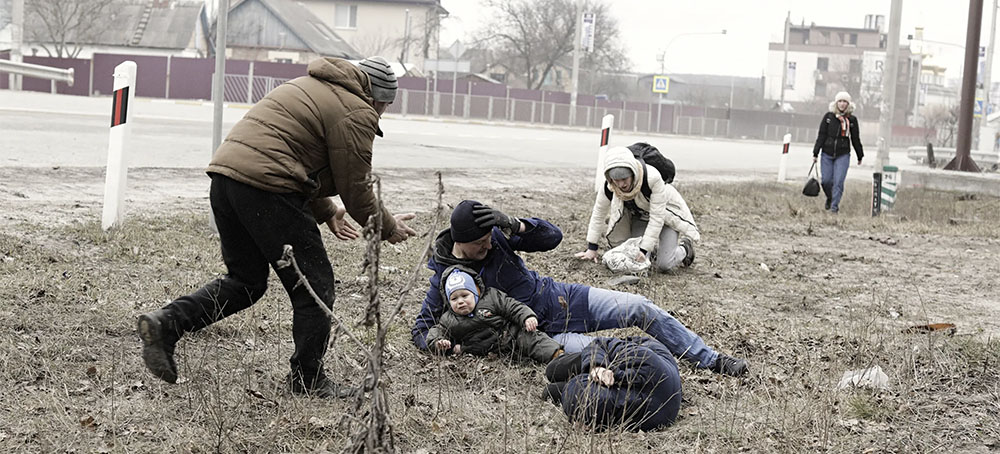 Ukraine. (photo: Jérôme Sessini/Magnum/The New Yorker)
Ukraine. (photo: Jérôme Sessini/Magnum/The New Yorker)
A Magnum photographer captures civilians dodging mortars as they try to escape the Russian advance on the city of Irpin.
The group pulled over a kilometre from the bridge, making sure to turn their vehicle around so it was pointed back toward Kyiv, in case they needed to make a getaway. They walked past a Ukrainian checkpoint and found themselves in front of the bridge, where ten to fifteen soldiers and civilians were working to help people cross the river on wooden planks. The sound of shelling seemed to be drawing closer, so Sessini took cover near a church. He was about to try to cross a street when he heard a large explosion. A mortar had landed several metres away. A piece of shrapnel struck Maxim Dondyuk, a Ukrainian photographer traveling with Sessini, in the right shoulder, resulting in what he described as a superficial wound. They decided to retreat toward the car. “It was too dangerous,” Sessini told me. They were making their way back through the town when another shell landed nearby. “That’s when I took the picture of the family,” Sessini said.
Sessini captured four people sprawled on the ground. There is a chubby-cheeked toddler, wearing a blue knit hat with a cartoon animal on it. He is bundled, head to toe, in a brown snowsuit. His face is congealed into a mask of terror. A man cradling the boy, presumably his father, holds his hand to his head, trying to recover his bearings. A figure, possibly an older child, is curled in a fetal position. A woman behind them, wearing a backpack, struggles to get to her feet. Sessini told me he was unable to talk to the family, because they were so frightened. People in cars were rescuing civilians from the road. The family clambered into a vehicle. They headed toward Kyiv, to an unknown future. Before Sessini reached the car, he passed several dead bodies on the pavement; a gray rolling suitcase sat nearby.
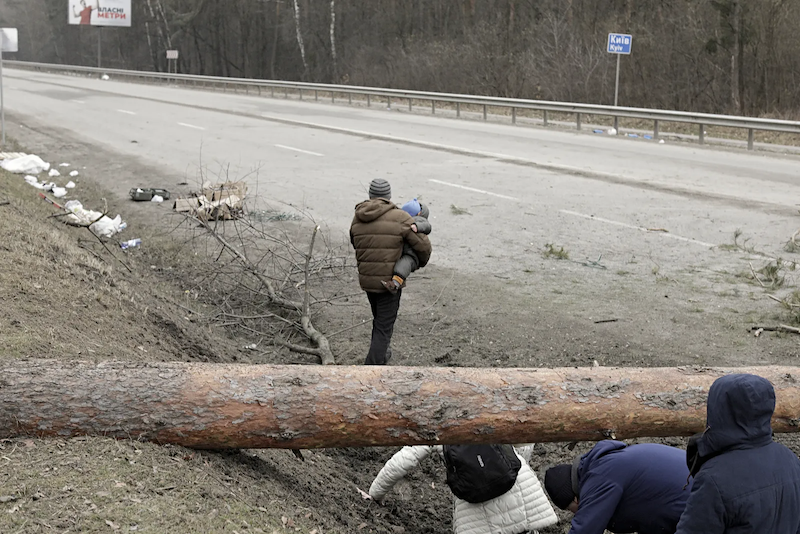
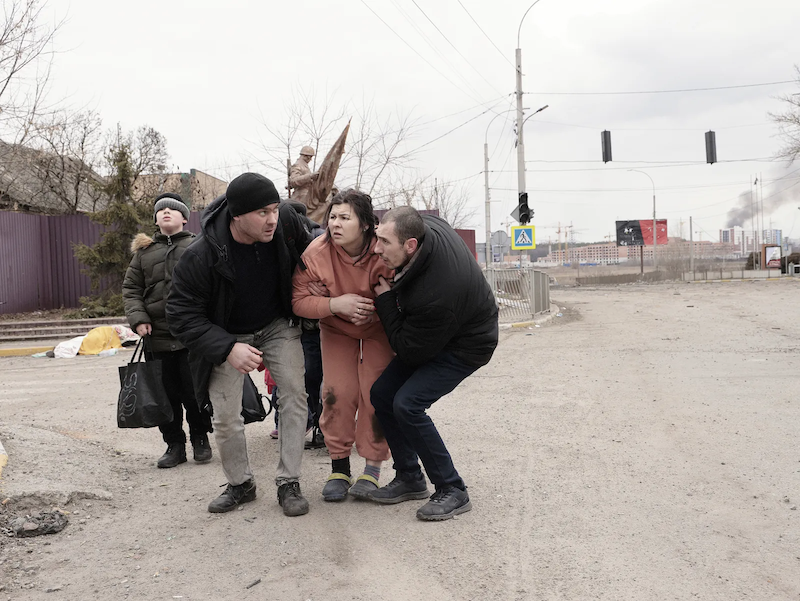
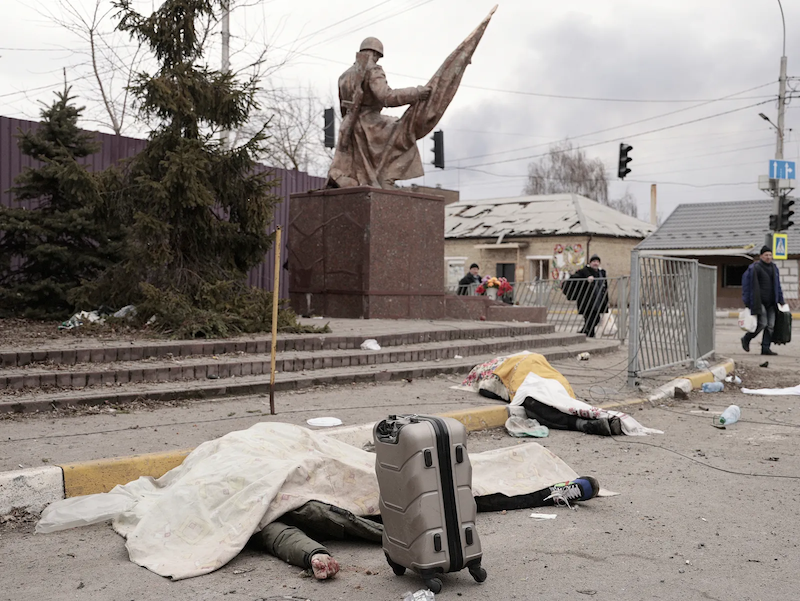
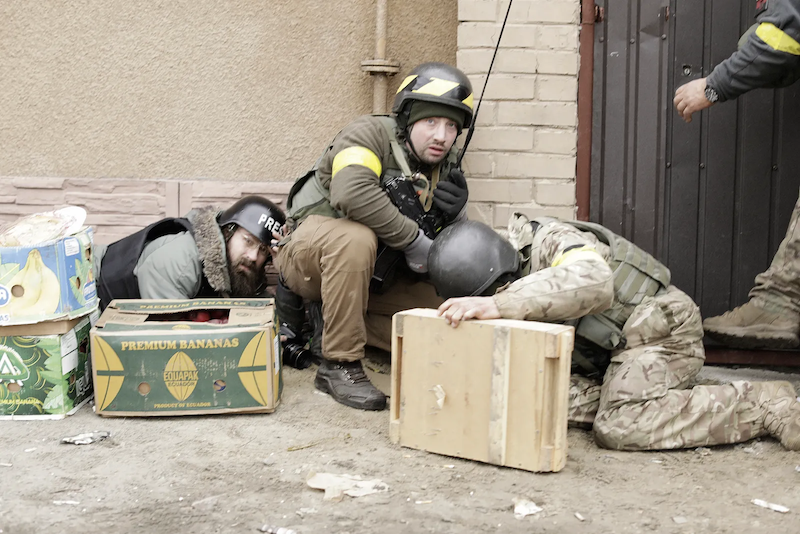
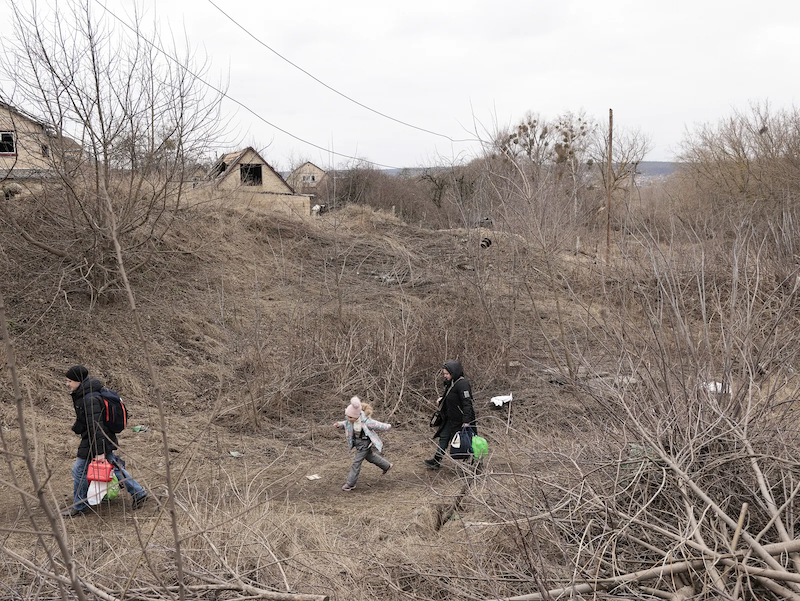
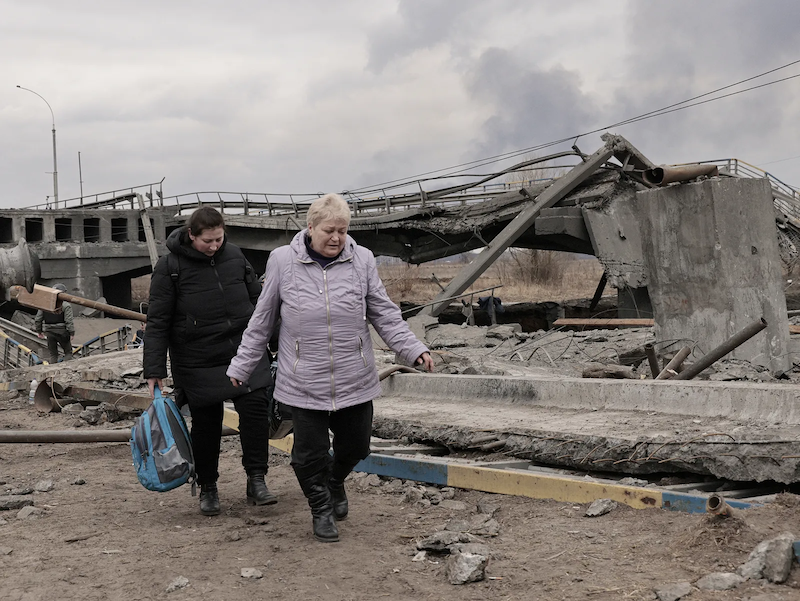

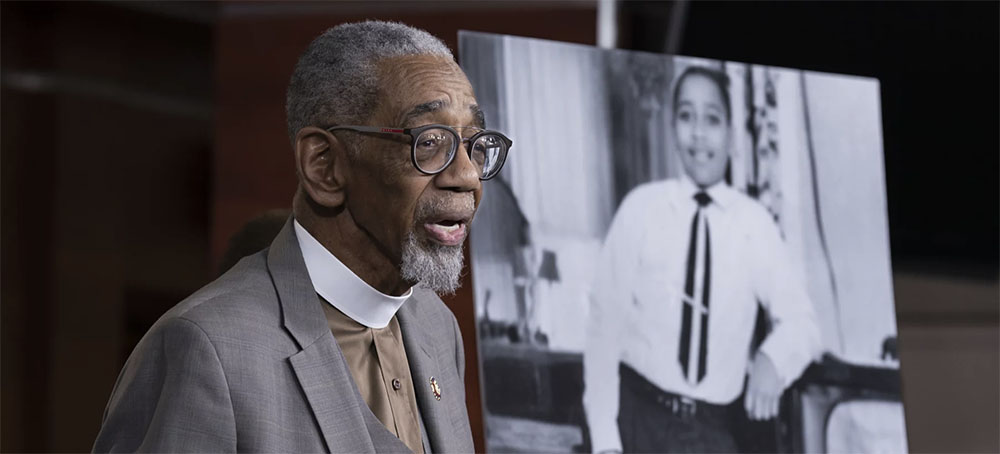 Rep. Bobby Rush, D-IL, speaks about the Emmett Till Anti-Lynching Act, which was named after a 14-year-old boy who was lynched in Mississippi in 1955. (photo: J. Scott Applewhite/AP)
Rep. Bobby Rush, D-IL, speaks about the Emmett Till Anti-Lynching Act, which was named after a 14-year-old boy who was lynched in Mississippi in 1955. (photo: J. Scott Applewhite/AP)
While it eased through both chambers of Congress this time with virtually no opposition, the path to passage took more than 100 years and 200 failed attempts.
Under the bill, named the Emmett Till Anti-Lynching Act after the 14-year-old boy from Chicago who was lynched while visiting family in Mississippi, a crime can be prosecuted as a lynching when a hate crime results in a death or injury, said Rep. Bobby Rush, D-Ill., a longtime sponsor of the legislation.
"Lynching is a longstanding and uniquely American weapon of racial terror that has for decades been used to maintain the white hierarchy," Rush said in a statement Monday evening. "Unanimous Senate passage of the Emmett Till Anti-Lynching Act sends a clear and emphatic message that our nation will no longer ignore this shameful chapter of our history and that the full force of the U.S. federal government will always be brought to bear against those who commit this heinous act."
Unanimous consent in the Senate allows a bill to pass without a roll call, so long as there's no senator present to object.
"Tonight the Senate passed my anti-lynching legislation, taking a necessary and long-overdue step toward a more unified and just America," Sen. Tim Scott, R-S.C., wrote on Twitter. "After working on this issue for years, I am glad to have partnered with colleagues on both sides of the aisle to finally get this done."
Other co-sponsors of the Senate bill were Sen. Cory Booker, D-N.J., and Sen. Rand Paul, R-Ky. Paul objected to a similar bill that passed the House in 2020. At the time, he said the measure was too broad.
By Monday night, he was satisfied with the bill's language, "which will ensure that federal law will define lynching as the absolutely heinous crime that it is," he said.
The scale of the crime is staggering: The Equal Justice Initiative documented 4,081 lynchings in 12 Southern states from 1877 to 1950. The report advocates for the erection of monuments and memorials to lynching victims to begin to "correct our distorted national narrative about this period of racial terror in American history while directly addressing the harms borne by the African American community, particularly survivors who lived through the lynching era."
Congress failed to pass legislation for more than a century. The first anti-lynching legislation was introduced in 1900 by Rep. George Henry White of North Carolina — then the body's only Black lawmaker. His bill failed to advance out of committee. The Senate passed a resolution in 2005 expressing remorse for failing to pass anti-lynching legislation; but Congress never passed a bill out of both chambers before Monday. The effort to pass an anti-lynching bill gained momentum after the murder of George Floyd in 2020.
The bill's passage marks a career-defining achievement for Rush, who has represented a Chicago-area district since 1993. He announced in January that he'll retire at the end of this Congress. Before politics, he was a longtime civil rights activist.
On Monday, he said he looked "forward to President Biden signing the Emmett Till Anti-Lynching Act into law very, very soon."
ADDED:
Emmett Till was brutally killed in the summer of 1955. At his funeral, his mother forced the world to reckon with the brutality of American racism.
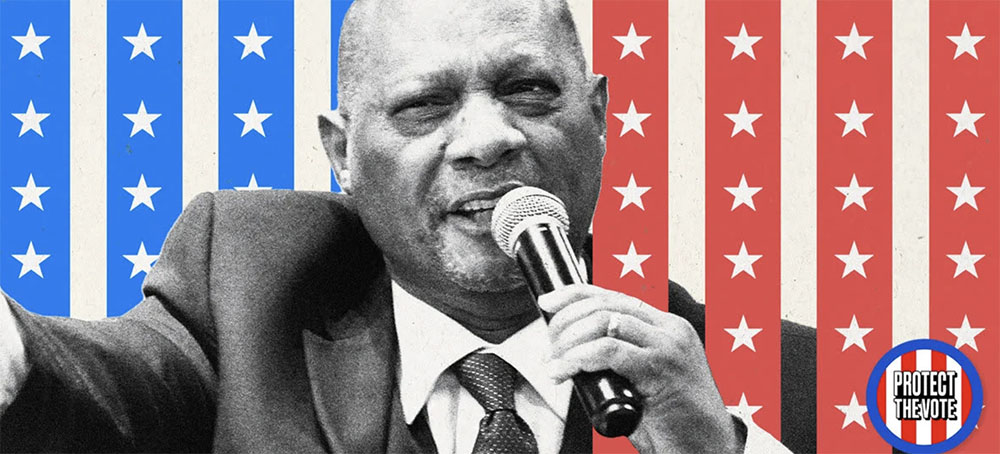 Bishop Reginald T. Jackson. (photo: Kelly Caminero/Elizabeth Brockway/The Daily Beast/AP)
Bishop Reginald T. Jackson. (photo: Kelly Caminero/Elizabeth Brockway/The Daily Beast/AP)
“We’ve risen to the occasion before,” said Bishop Reginald T. Jackson, who oversees 500 Black churches in Georgia. “I’m hopeful and confident we’ll rise to the occasion again.”
It was gray.
Jackson, a native of the state capital of Dover, was just 18, barely eligible to vote. But he was so inspired by the upstart Biden—then mounting what was considered a hopeless challenge against the longtime Republican senator Cale Boggs—that Jackson spent his days volunteering on his behalf.
Fifty years later, their paths have converged again.
Biden, of course, pulled off that upset victory in 1972. His subsequent 36 years in the Senate put him on a path to the Oval Office that he occupies today.
Jackson, meanwhile, went into the ministry. Four years after volunteering for Biden, he came to Atlanta to study at a seminary. He returned decades later to take over one of the most influential pulpits in the state: the head bishop in Georgia of the African Methodist Episcopal Church, the first Christian denomination founded by Black Americans.
From that perch, Jackson was a key leader in the years-long project of engaging and organizing Black voters in Georgia—a project that helped deliver Biden the presidency and control of the U.S. Senate to Democrats.
Now, Georgia is ground zero for the competing forces fighting to shape American democracy. In response to Democrats’ 2020 victories, the Republicans who control Georgia’s government moved quickly to pass a sweeping and complicated set of new election rules that will, on balance, restrict voting options.
The so-called “Election Integrity Act of 2021,” also known by its shorthand of SB 202, will define the terms of two key contests in Georgia this year: the reelection of Gov. Brian Kemp—the architect of the law—and that of Sen. Raphael Warnock (D-GA), himself a renowned pastor, and a lead voting rights advocate.
Biden spent the last year pushing Congress to send him legislation to codify those rights nationwide in the face of bills like SB 202. And Jackson spent the last year urging Biden, and his Senate colleagues, to do more—through rallies, speeches, and sharply critical op-eds in the pages of The New York Times.
That push culminated in a high-profile and heartbreaking failure for Democrats. And the courts do not seem poised to offer relief. Jackson, one of several leading plaintiffs who have filed lawsuits against SB 202, said he is pessimistic about the case’s chance of success.
With no help on the way, Jackson, like many others, quickly turned grief into action. The only way to overcome new voting barriers at this point, activists say, is to adapt—and then try to muscle through them.
“We are starting now,” Jackson told The Daily Beast in an interview. “Whatever the law requires, we’re teaching and training and organizing to deal with that.”
There are a number of activists in Georgia doing that work, particularly Black women, who powered the decade-long effort to register as many voters in the state as possible. The activist often credited for that effort, Stacey Abrams, is challenging Kemp in the governor’s election this year, a rematch of their 2018 contest.
But Jackson also has a unique role to play in ensuring that Georgia’s historically marginalized groups can freely exercise their rights to vote. As the head clergyman overseeing more than 500 AME churches, Jackson has extensive reach and influence with thousands of Black voters across the state.
The 67-year old pastor plans to use that reach to ensure that his flock gets to the polls, no matter what obstacles they may face. He said that, along with other AME Church leaders, a yearlong effort is already underway to ensure every parishioner is registered to vote, and has the information they need to have their vote counted.
The slew of changes that SB 202 made to Georgia election law will make the work far more difficult than ever before: it will require a considerable baseline effort just to inform voters about the new rules. The new restrictions raise the stakes of that work, too. If Jackson and fellow leaders fall short, thousands of Black Georgians’ voices may go unheard at the polls in a critical election year.
What happens next, Jackson says, “is going to depend on how determined we are. Blacks are resilient people. We’ve risen to the occasion before. I’m hopeful and confident we’ll rise to the occasion again.”
Faith leaders, particularly those in the Black church, have fought for voting rights in Georgia for decades, and they’ve had an outsized impact in that struggle.
Cliff Albright, co-founder of the activist group Black Voters Matter, said Jackson is continuing a tradition of advocacy and organizing in the Black church that began in the civil rights movement of the 1950s and 1960s.
Albright pointed not only to Jackson’s lawsuit against SB 202, but his efforts to bring scrutiny to Georgia corporate titans like Delta Air Lines and Coca-Cola, which activists believe failed to sufficiently oppose the legislation.
“They have a huge role to play in raising awareness about these laws and changes, and about elections in general,” Albright said of pastors like Jackson. “We’re going to need them to continue playing a leading role, which is in the tradition of the Black church, fighting for civil rights and voting rights.”
When Jackson arrived in Georgia in 2016, he had just come from decades of ministry in New Jersey. He considers himself a so-called “Democrat with an open mind” and supported moderate Republicans in the Garden State, like the former governor and George W. Bush appointee Christine Todd Whitman.
But the rise of Donald Trump, and the political environment he ushered in, put Jackson in a different headspace. One of his first meetings in Georgia focused on low-turnout among Black voters in 2016, when Trump carried the state by five percentage points.
“I was frustrated and angry with Georgia… my frustration was the Black turnout was very low,” Jackson said. “I was determined that in 2020, we were going to have a much better turnout.”
In order to make that happen, Jackson launched what he called “Operation Voter Turnout,” a full-scale effort across every AME church in Georgia to mobilize voters. It required each church to set up a committee ensuring that every eligible voter in their congregation was registered, and to keep those voters up to date on key issues.
The AME Church’s operation was one prong of the broad, years-long campaign to increase Black voter turnout after 2016. The New Georgia Project, Abrams’ organization, poured millions of dollars into standing up an army of organizers and volunteers to register and mobilize Black communities around the state.
That intensive work bore fruit; the number of Black registered voters in Georgia jumped by 130,000 between Trump’s 2016 victory and Biden’s in 2020—a 25 percent increase, more than any other racial group in the state.
The progress didn’t immediately translate into an increased voice for Black voters, however. In the November 2020 election, Black voters’ share of the overall Georgia electorate was 27 percent—its lowest level since 2006, according to a New York Times analysis.
The January Senate runoff elections, when Democrats Warnock and Jon Ossoff scored stunning victories against former GOP Sens. Kelly Loeffler and David Perdue, were a different story.
Turnout among all voters, but especially Black voters, tends to drop during Georgia’s runoffs. Instead, after an unprecedented mobilization effort by Democratic-aligned organizers, the Black share of the electorate was over 30 percent. According to The Washington Post, if Black voters had turned out at the rate they had in the 2018 runoffs, Ossoff would have lost by 30,000 votes, and Warnock’s race would have been too close to call.
Days after Warnock and Ossoff’s victories, Kemp and Georgia Republicans began their own project—fixing, in their telling, a flawed election system that lacked the public’s trust.
It didn’t matter that top Georgia election officials, like Secretary of State Brad Raffensperger, called the 2020 election the most secure one yet in the state, with record numbers of voters making their voices heard.
What did matter was the GOP base’s enthusiastic embrace of Trump’s baseless conspiracies of widespread voter fraud, putting immense pressure on Kemp and GOP leaders to respond. It ultimately took them less than 90 days to write, consider, and pass SB 202.
That legislation will, on balance, make it harder for many Georgians to vote in 2022 than it was in 2020, by limiting their options to cast a ballot and restricting the timeframe to do so.
Democratic voting rights advocates, like Jackson, say in unequivocal terms these changes are aimed squarely at Black voters. SB 202, he said, has “really been intentionally designed to send a message to Black voters, as if to say, you all turned out to vote in large numbers in 2020, and we’re going to punish you for that.”
Many of the law’s changes are subtle, but advocates and some academics believe they will have an outsized impact on minority voters who have relied on several of the voting methods that SB 202 will restrict now.
Saira Draper, Voter Protection Director for the Georgia Democratic Party, said the legislation “fundamentally changes the voting landscape in Georgia” and likened it to “death by a thousand cuts.”
Under SB 202, for example, it will be harder for voters to request an absentee ballot—they now cannot do so online, for example, and local governments and third-party organizations risk a financial penalty if they send an absentee ballot request to a voter who already got one.
Voters will also have far less time to return those absentee ballots once completed. On top of that, the law reduces the number of ballot drop boxes—now one for every 100,000 people in a county—and sharply restricts the hours that they’re available.
The law also provides for some extraordinary ways motivated parties can intervene in Georgia elections, which advocates fear could be leveraged to devastating effect. It cracks a door for politicians to replace county-level elections administrators by allowing a small number of officials to ask the State Elections Board to investigate counties suspected to be “underperforming.”
The process could result in the state board, which has a GOP majority, replacing a county’s election officials with a person of their choosing, to serve for as long as a year and a half.
Republicans moved quickly to make use of this new law, and they aimed it at a perennial target: Fulton County, home to much of the city of Atlanta, and to hundreds of thousands of eligible Black voters. Its election board is currently under review by the state, and Raffensperger recently said they could be replaced.
Beyond that, the law allows just a single person to formally challenge an unlimited number of ballots. Counties are legally mandated to consider those challenges within 10 days, and voters who have their ballots targeted are required to show up for proceedings.
Over 360,000 ballots in the January runoffs were challenged, and while only a dozen were actually thrown out, activists believe that Republicans could use the challenges to overwhelm counties and to discourage voters from participating.
Still, it’s not all bad news for minority voters. Some experts believe that SB 202 won’t have a great impact on the 2022 election—and could even come back to haunt its Republican authors.
Charles Bullock, a longtime professor of political science at the University of Georgia, said the GOP made new election rules without accounting for how voters’ behavior could change, especially once the COVID pandemic recedes. He argued that SB 202 gives Democrats, like the party’s standard-bearer, Abrams, a perfect tool to mobilize voters.
“Republicans were trying to make it somewhat harder to vote,” Bullock said. “Will they succeed? I’m not sure. They may have shot themselves in the foot.”
Jackson agreed on some level. “When you tell us what we can’t do,” he said, “it makes us more determined to do it.”
The failure to secure federal voting protections by his old idol, Biden, certainly adds to his determination.
Jackson doesn’t blame Biden for the plight in which Georgia activists are now in—his words are far harsher for the two Democratic senators who resisted changing Senate rules to pass the election reforms—but he did say Biden could have borrowed some pages from the playbook of President Lyndon B. Johnson, who worked Congress to pass civil rights legislation in the 1960s.
The parallels between then and now, Jackson said, are too clear. During a lengthy conversation with The Daily Beast, the pastor spoke in a casual lilt—not the rhythmic cadence that bursts forward from the pulpit when he preaches.
But, at one point, Jackson posed a question that inspired just a shade of the voice usually on display on Sundays.
“The American people, if they’re genuine, need to start asking the question: Is it right?” Jackson said. “We need to ask ourselves, is it right that the greatest right we have in this democracy is the right to vote, and rather than making it easier for people to vote, you intentionally go out of your way to make it harder to vote?”
“The question is, is it right?” Jackson asked. “That is the question this nation needs to be asking itself. And I think we know the answer.”
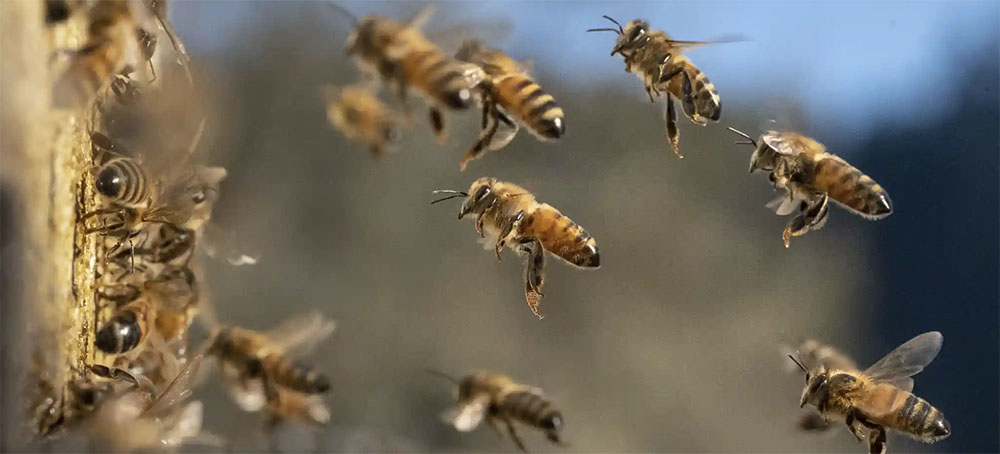 Honeybees on a farm near Elkton in rural western Oregon. The use of neonicotinoids, hailed by industry as a key to bumper crop yields, has exploded since the 1990s. (photo: Robin Loznak/Zuma/Rex/Shutterstock)
Honeybees on a farm near Elkton in rural western Oregon. The use of neonicotinoids, hailed by industry as a key to bumper crop yields, has exploded since the 1990s. (photo: Robin Loznak/Zuma/Rex/Shutterstock)
EPA to approve plan for four types of neonicotinoid chemical to be used on US farmland – despite being banned in Europe
The EPA is widely expected to confirm a proposed plan outlined last year that will extend the use of imidacloprid, thiamethoxam, clothianidin and dinotefuran on US farmland for the next 15 years, even though the agency has noted “ecological risks of concern, particularly to pollinators and aquatic invertebrates”.
These four insecticides are all types of neonicotinoids, a class of chemicals that is widely used on crops to treat them for pests but has been found to cause devastation among non-target insects, such as bees. The chemicals assault receptors in an insect’s nerve synapse, causing uncontrollable shaking, paralysis and death.
Neonicotinoids are used across 150m acres of American cropland, an area roughly the size of Texas, and have contributed to the land becoming 48 times more toxic than it was a quarter of a century ago. The chemicals are water soluble and quickly leach out of plants into soils and streams, causing such harmful impacts to wildlife that Canada has restricted their use while the EU has banned the outdoor deployment of clothianidin, imidacloprid and thiamethoxam.
But while states such as Connecticut and New Jersey have enacted some curbs on neonicotinoids, the US federal government is set to bend to pressure from farming groups and pesticide makers to perpetuate their use nationally.
“We are already seeing crashes in insect numbers and we don’t have another 15 years to waste,” said Nathan Donley, environmental health science director at the Center for Biological Diversity.
“It’s frustrating to see the EPA go down this path. We really are at a crossroads – we can follow the science and the rest of the world or we can go out on our own and appease the chemical industry.”
An EPA spokeswoman said that review decisions for the neonicotinoids will be issued in “late 2022” and that mitigation rules for their use are being considered. “We understand the importance of pollinators for healthy ecosystems and a sustainable food supply,” she said, adding that the EPA “is working aggressively to protect pollinators, including bees”.
An outright ban, similar to the EU, appears unlikely for the US, however. “While the agency reviews the regulatory efforts of the EU, EPA also looks at regulation in countries such as Australia, Canada, Japan, New Zealand, and others that share our risk-based approach to regulation,” said the spokeswoman. “The differences in the details of our underlying laws can naturally lead to different regulatory conclusions.”
The use of neonicotinoids, hailed by industry as a key to bumper crop yields, has exploded since the 1990s. The chemicals are sprayed directly on to fruit and vegetables but are most commonly found embedded in the coating of corn and soybean seeds sold by companies such as Bayer and Syngenta to farmers.
Only a small fraction of the insecticide stays within the growing plant, however, instead seeping into pollen, water and soils where insects are exposed to it. Researchers have found that the cognitive functions of bees are scrambled by the chemicals, making them unable to find their way to their hives, while affected beetles stagger around as if drunk.
Neonicotinoids also harm birds, studies have shown, while their benefits are questionable, with crop yields in many cases not improved by the indiscriminate use of the chemicals.
“These insecticides are not helping the productivity of crops on fields – it seems an amazing effort to blanket all these acres with something that doesn’t have a return on investment,” said John Tooker, an entomologist at Penn State University.
“These seeds are marketed so well to farmers that they become scared they will have a catastrophic outbreak of pests if they don’t use them, even though this is unlikely. It has contributed to this toxic landscape across the country.”
The application of pesticides, along with habitat loss and climate change, has been cited as the main causes of spectacular insect declines recorded in the US as well as several European countries. Worldwide, it is estimated that insect populations are dropping by as much as 2% a year, with the United Nations warning that half a million species could be wiped out this century.
Tooker said that neonicotinoids, if used judiciously, can be useful but that their ubiquity has contributed to insects’ woes. “It’s difficult to dismiss the increasing toxicity in the landscape and think it’s doing nothing to insect populations,” he said. “These are the most powerful insecticides ever produced. We are just making insects’ lives harder in every possible way.”
Environmental groups, meanwhile, have launched a legal effort to force the EPA to regulate neonicotinoid-coated seeds and have urged the agency to reduce the number of “emergency” permits issued to states that request the spraying of the chemicals beyond what is normally allowed without a full review process.
The EPA is considering allowing farmers in Florida to spray clothianidin on 125,000 acres of citrus crops, including oranges, grapefruits and lemon, which would be the ninth consecutive year such an emergency request has been granted.
“It defies all logic to say an emergency has been going on for nine years, the process has been clearly abused,” Donley said. “The science is so conclusive that these chemicals are harmful to the environment that this emergency exemption process is being used as a backdoor approval that goes on forever.
“We need an administration that is willing to think about reform and challenge the status quo and we haven’t seen that with the Biden administration. It is certainly better than Trump but there is a lot of disappointment at the lost opportunity for change.”
Follow us on facebook and twitter!
PO Box 2043 / Citrus Heights, CA 95611

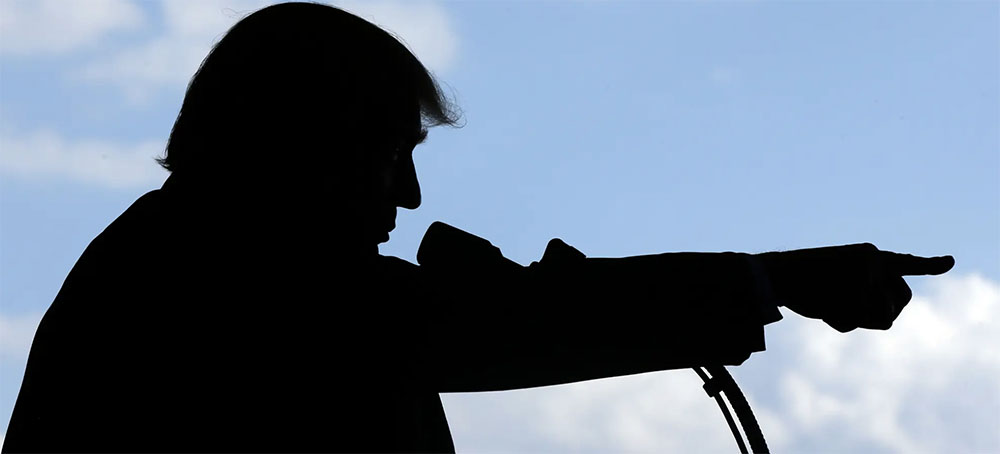

No comments:
Post a Comment
Note: Only a member of this blog may post a comment.